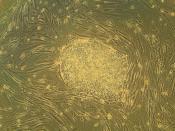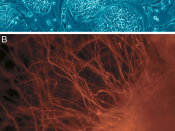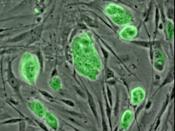Joey Lasiter
Professor Beaudry
English 103
1, November 2006
Stem Cell Research: A Brave New World
Science and ethics are at a constant battle; it is frequently difficult for science related issues to keep moral conduct in agreement with the procedures conducted in research. Human embryonic stem cell research, a more recent development, is one of the much-debated issues between science and beliefs today. Ethics and morals of life pertain to an individual's judgment. It cannot be easily defined for the reason being that each individual has a particular opinion on any given subject. Ethics bring up questions, concerns, and debates. There are seemingly good as well as bad results to technology. There is no precise system in determining the correct advancements and techniques for scientific research. Whether these techniques used conflict with the rights of people or the rights to medical care is the prime concern (Ethical Issues).
The source for human embryonic stem cells (HESC) is where the controversy begins. The human embryo has much to debate about because of what an embryo is to our society and the potential that it holds. It is true that an embryo has the potential to become a human being, but when can you officially call it a human. Simply, the question is whether the embryo should be considered a human or not. "Unfortunately, this developmental view of moral status is rather arbitrary, and conveniently allows too much room for adjustment to the particular research application," (Gilbert). There are so many stages in the development of the embryo where anyone can claim an embryo becomes a human being; that stage brings the subject in dispute. Basically, you need to decide if the potential benefits from HESC research outweigh its moral opposition.
HESC research has continual possible advancements in...


